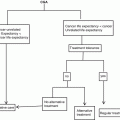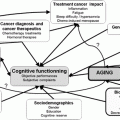C-PLD
C-P
p
Febrile neutropenia
None
100
94
0.038
Present
0
6
Alopecia
None
89
14
<0.001
Partial/complete
11
86
Sensory neuropathy
Grade 0–1
90
64
<0.001
Grade 2–3
10
36
Hand-foot syndrome
Grade 0–1
86
98
<0.001
Grade 2–3
14
2
Arthralgia/myalgia
Grade 0–1
97
78
<0.001
Grade 2–3
3
22
The incorporation of bevacizumab in treatment schedules for recurrent, platinum-sensitive disease has been assessed in the OCEANS trial that enrolled patients, regardless of age [14]. In this trial, bevacizumab was compared to placebo, combined to gemcitabine and carboplatin. Indeed, 35 % and 38 % of these were older than 65 in the bevacizumab and placebo arm, respectively, although more accurate data toward age distribution is not available. The trial concluded to the superiority of the bevacizumab-containing arm, with a side-effect spectrum marked by hypertension and chemotherapy-induced myelotoxicity. Efficacy analysis in the >65 years old population showed again a favorable PFS hazard ratio toward bevacizumab (HR = 0.50, CI95% 0.34–0.72). Although shown feasible in selected patients to be enrolled into a phase III trial, it is unclear whether the carboplatin-gemcitabine chemotherapy backbone suits all elderly patients, due to its toxicity profile. The ongoing AGO 2.21 study (NCT01837251), currently recruiting adult patients regardless of age, compares the CALYPSO and OCEANS schedules, both in combination with bevacizumab. The study has a PFS primary end point, and secondary end point includes safety and quality of life. Hopefully, some analysis will be undertaken to explore these issues in the elderly patient subpopulation.
Platinum-Refractory and Resistant Patients
As discussed above, platinum-resistant and refractory patients have a poor prognosis and, at the time of recurrence, have usually not recovered from initial weight loss and side effects of frontline therapy. Hence they often present with fatigue, impaired functional capacity, and for the elderly, a high risk of lack of autonomy. It is not surprising that in this setting, performance status (despite its limitations) is a key prognosis factor when considering salvage chemotherapy. Yet, given the very poor prognosis of platinum-refractory patient, most of the published data focus onto platinum-resistant ovarian cancer. In a retrospective series of 102 patients, Gronlund et al. found that three prognostic factors independently impact overall survival: performance status at initial and salvage therapy and response to second-line therapy [15]. Since no combination chemotherapy has proven superiority over single-agent therapy in this setting, therapeutic options include gemcitabine, pegylated liposomal doxorubicin, topotecan, and weekly paclitaxel [10]. Despite there is no trial specifically assessing these drugs in elderly recurrent ovarian cancer, some phase III trials included elderly patients and concluded to similar efficacy with acceptable, albeit different, toxicity profiles [16, 17]. More recently, the AURELIA trial assessed the combination of bevacizumab with any of these drugs versus single-agent chemotherapy [18]. Again, the trial included elderly patients, and concluded to the superiority of the bevacizumab arm. A post-hoc analysis of the AURELIA study has been undertaken, to explore the outcomes of elderly versus young patients in the study, although the cutoff boundary for old age was only 65 [19]. Nevertheless, 133 patients aged ≥65 years old were compared to 227 young (<65) patients. The benefit from adding bevacizumab was also found in the elderly subgroup, with a PFS hazard ratio of 0.47 (CI95% 0.32-0.70). Moreover, no major difference in safety was observed, despite that hypertension was more frequent in elderly patients and in those receiving bevacizumab, suggesting a favorable risk/benefit ratio in this population.
Stay updated, free articles. Join our Telegram channel

Full access? Get Clinical Tree





